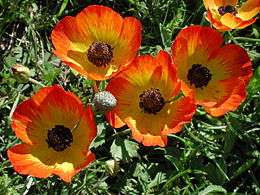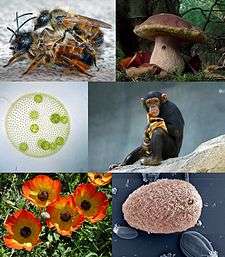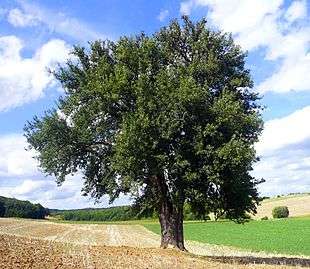Definify.com
Webster 1913 Edition
Plant
Plant
,Noun.
[AS.
plante
, L. planta
.] 1.
A vegetable; an organized living being, generally without feeling and voluntary motion, and having, when complete, a root, stem, and leaves, though consisting sometimes only of a single leafy expansion, or a series of cellules, or even a single cellule.
☞ Plants are divided by their structure and methods of reproduction into two series, phænogamous or flowering plants, which have true flowers and seeds, and cryptogamous or flowerless plants, which have no flowers, and reproduce by minute one-celled spores. In both series are minute and simple forms and others of great size and complexity.
As to their mode of nutrition, plants may be considered as self-supporting and dependent. Self-supporting plants always contain chlorophyll, and subsist on air and moisture and the matter dissolved in moisture, and as a general rule they excrete oxygen, and use the carbonic acid to combine with water and form the material for their tissues. Dependent plants comprise all fungi and many flowering plants of a parasitic or saprophytic nature. As a rule, they have no chlorophyll, and subsist mainly or wholly on matter already organized, thus utilizing carbon compounds already existing, and not excreting oxygen. But there are plants which are partly dependent and partly self-supporting. The movements of climbing plants, of some insectivorous plants, of leaves, stamens, or pistils in certain plants, and the ciliary motion of zoospores, etc., may be considered a kind of voluntary motion.2.
A bush, or young tree; a sapling; hence, a stick or staff.
“A plant of stubborn oak.” Dryden.
3.
The sole of the foot.
[R.]
“Knotty legs and plants of clay.” B. Jonson.
4.
(Com.)
The whole machinery and apparatus employed in carrying on a trade or mechanical business; also, sometimes including real estate, and whatever represents investment of capital in the means of carrying on a business, but not including material worked upon or finished products;
as, the
. plant
of a foundry, a mill, or a railroad5.
A plan; an artifice; a swindle; a trick.
[Slang]
It was n’t a bad
plant
, that of mine, on Fikey. Dickens.
6.
(Zool.)
(a)
An oyster which has been bedded, in distinction from one of natural growth.
(b)
A young oyster suitable for transplanting.
[Local, U.S.]
Plant bug
(Zool.)
, any one of numerous hemipterous insects which injure the foliage of plants, as
– Lygus lineolaris
, which damages wheat and trees. Plant cutter
(Zool.)
, a South American passerine bird of the genus
– Phytotoma
, family Phytotomidæ
. It has a serrated bill with which it cuts off the young shoots and buds of plants, often doing much injury. Plant louse
(Zool.)
, any small hemipterous insect which infests plants, especially those of the families
Aphidæ
and Psyllidæ
; an aphid.Plant
,Verb.
T.
[
imp. & p. p.
Planted
; p. pr. & vb. n.
Planting
.] 1.
To put in the ground and cover, as seed for growth;
as, to
. plant
maize2.
To set in the ground for growth, as a young tree, or a vegetable with roots.
Thou shalt not
plant
thee a grove of any trees. Deut. xvi. 21.
3.
To furnish, or fit out, with plants;
as, to
. plant
a garden, an orchard, or a forest4.
To engender; to generate; to set the germ of.
It engenders choler,
planteth
anger. Shakespeare
5.
To furnish with a fixed and organized population; to settle; to establish;
as, to
. plant
a colonyPlanting
of countries like planting of woods. Bacon.
6.
To introduce and establish the principles or seeds of;
as, to
. plant
Christianity among the heathen7.
To set firmly; to fix; to set and direct, or point;
as, to
plant
cannon against a fort; to plant
a standard in any place; to plant
one's feet on solid ground; to plant
one's fist in another's face.8.
To set up; to install; to instate.
We will
plant
some other in the throne. Shakespeare
Plant
,Verb.
I.
To perform the act of planting.
I have
planted
; Apollos watered. 1 Cor. iii. 6.
Webster 1828 Edition
Plant
PLANT
,Noun.
1.
A vegetable; an organic body, destitute of sense and spontaneous motion, adhering to another body in such a manner as to draw from it its nourishment, and having the power of propagating itself by seeds; 'whose seed is in itself.' Gen.1. This definition may not be perfectly correct, as it respects all plants, for some marine plants grow without being attached to any fixed body.The woody or dicotyledonous plants consist of three parts; the bark or exterior coat, which covers the wood; the wood which is hard and constitutes the principal part; and the pith or center of the stem. In monocotyledonous plants, the ligneous or fibrous parts, and the pithy or parenchymatous, are equally distributed through the whole internal substance; and in the lower plants, funguses, sea weed, &c. the substance is altogether parenchymatous. By means of proper vessels, the nourishing juices are distributed to every part of the plant. In its most general sense, plant comprehends all vegetables, trees, shrubs, herbs, grasses, &c. In popular language,the word is generally applied to the smaller species of vegetables.
2.
A sapling.3.
In Scripture, a child; a descendant; the inhabitant of a country. Ps.144. Jer.48.4.
The sole of the foot. [Little used.]Sea-plant, a plant that grows in the sea or in salt water; sea weed.
Sensitive plant, a plant that shrinks on being touched,the mimosa.
PLANT
,Verb.
T.
1.
To set in the ground for growth, as a young tree or a vegetable with roots.2.
To engender; to set the germ of any thing that may increase. It engenders choler, planteth anger.
3.
To set; to fix. His standard planted on Laurentum's towers.
4.
To settle; to fix the first inhabitants; to establish; as, to plant a colony.5.
To furnish with plants; to lay out and prepare with plants; as, to plant a garden or an orchard.6.
To set and direct or point; as, to plant cannon against a fort.7.
To introduce and establish; as, to plant christianity among the heathen. I have planted, Apollos watered, but God gave the increase. 1 Cor.3.
8.
To unite to Christ and fix in a state of fellowship with him. Ps.92.PLANT
,Verb.
I.
Definition 2026
plant
plant
English
| Picture dictionary | |||||
|---|---|---|---|---|---|
| |||||
|
Noun
plant (plural plants)
- (botany) An organism that is not an animal, especially an organism capable of photosynthesis. Typically a small or herbaceous organism of this kind, rather than a tree.
- 2013 May-June, Katrina G. Claw, “Rapid Evolution in Eggs and Sperm”, in American Scientist, volume 101, number 3, page 217:
- In plants, the ability to recognize self from nonself plays an important role in fertilization, because self-fertilization will result in less diverse offspring than fertilization with pollen from another individual. Many genes with reproductive roles also have antibacterial and immune functions, which indicate that the threat of microbial attack on the sperm or egg may be a major influence on rapid evolution during reproduction.
- The garden had a couple of trees, and a cluster of colourful plants around the border.
-
- (botany) An organism of the kingdom Plantae; now specifically, a living organism of the Embryophyta (land plants) or of the Chlorophyta (green algae), a eukaryote that includes double-membraned chloroplasts in its cells containing chlorophyll a and b, or any organism closely related to such an organism.
- (ecology) Now specifically, a multicellular eukaryote that includes chloroplasts in its cells, which have a cell wall.
- (proscribed as biologically inaccurate) Any creature that grows on soil or similar surfaces, including plants and fungi.
- A factory or other industrial or institutional building or facility.
- An object placed surreptitiously in order to cause suspicion to fall upon a person.
- That gun's not mine! It's a plant! I've never seen it before!
- Anyone assigned to behave as a member of the public during a covert operation (as in a police investigation).
- A person, placed amongst an audience, whose role is to cause confusion, laughter etc.
- (snooker) A play in which the cue ball knocks one (usually red) ball onto another, in order to pot the second; a set.
- 2008, Phil Yates, The Times, April 28 2008:
- O’Sullivan risked a plant that went badly astray, splitting the reds.
- 2008, Phil Yates, The Times, April 28 2008:
- (uncountable) Machinery, such as the kind used in earthmoving or construction.
- (obsolete) A young tree; a sapling; hence, a stick or staff.
- (Can we date this quote?) Dryden
- a plant of stubborn oak
- (Can we date this quote?) Dryden
- (obsolete) The sole of the foot.
- (Can we date this quote?) Ben Jonson
- knotty legs and plants of clay
- (Can we date this quote?) Ben Jonson
- (dated, slang) A plan; a swindle; a trick.
- (Can we date this quote?) Charles Dickens
- It wasn't a bad plant, that of mine, on Fikey.
- (Can we date this quote?) Charles Dickens
- An oyster which has been bedded, in distinction from one of natural growth.
- (US, dialect) A young oyster suitable for transplanting.
Usage notes
The scientific definition of what organisms should be considered plants changed dramatically during the 20th century. Bacteria, algae, and fungi are no longer considered plants by those who study them. Many textbooks do not reflect the most current thinking on classification.
Hypernyms
- (biology): Archaeplastida
Hyponyms
Hyponyms of plant
Derived terms
Terms derived from plant
|
Related terms
- plant disease
- plant pot
- plant room
Translations
organism capable of photosynthesis
|
|
a small or herbaceous organism, rather than a tree
organism of the kingdom Plantae
ecology: multicellular eukaryote that includes chloroplasts in its cells
factory — see factory
object placed to incriminate
|
snooker shot
|
large piece of machinery
|
Verb
plant (third-person singular simple present plants, present participle planting, simple past and past participle planted)
- (transitive) To place (a seed or plant) in soil or other substrate in order that it may live and grow.
- (transitive) To place (an object, or sometimes a person), often with the implication of intending deceit.
- That gun's not mine! It was planted there by the real murderer!
- (transitive) To place or set something firmly or with conviction.
- Plant your feet firmly and give the rope a good tug.
- to plant cannon against a fort; to plant a flag; to plant one's feet on solid ground
- To place in the ground.
- 2007, Richard Laymon, Savage, page 118:
- Sarah, she kissed each of her grandparents on the forehead. They were planted in a graveyard behind the church.
- 2007, Richard Laymon, Savage, page 118:
- To furnish or supply with plants.
- to plant a garden, an orchard, or a forest
- To engender; to generate; to set the germ of.
- (Can we date this quote?) Shakespeare
- It engenders choler, planteth anger.
- (Can we date this quote?) Shakespeare
- To furnish with a fixed and organized population; to settle; to establish.
- to plant a colony
- (Can we date this quote?) Francis Bacon
- planting of countries like planting of woods
- To introduce and establish the principles or seeds of.
- to plant Christianity among the heathen
- To set up; to install; to instate.
- (Can we date this quote?) Shakespeare
- We will plant some other in the throne.
- (Can we date this quote?) Shakespeare
Derived terms
Related terms
Translations
place in soil or other substrate in order that it may live and grow
|
|
to place (an object, or sometimes a person), often with the implication of intending deceit
|
to place or set something firmly or with conviction
See also
Dutch
Etymology 1
From Middle Dutch plante, from Latin planta.[1] Doublette with clan (“clan, tribe”).
Pronunciation
- IPA(key): /plɑnt/
- Hyphenation: plant
Noun
plant f (plural planten, diminutive plantje n)
Derived terms
Verb
plant
- first-, second- and third-person singular present indicative of planten
- imperative of planten
Etymology 2
Pronunciation
- Hyphenation: plant
Verb
plant
- second- and third-person singular present indicative of plannen
- (archaic) plural imperative of plannen
References
- ↑ Philippa, M.; Debrabandere, F.; Quak, A.; Schoonheim, T.; Van der Sijs, N. (2003–2009) Etymologisch woordenboek van het Nederlands (in Dutch), Amsterdam: Amsterdam University Press
German
Verb
plant
- Third-person singular present of planen.
- Second-person plural present of planen.
- Imperative plural of planen.
Old Welsh
Etymology
Noun
plant ?
Descendants
Welsh
Etymology
From Old Welsh plant, a borrowing from Latin planta.
Pronunciation
- IPA(key): /plant/
Noun
plant m (singulative plentyn)
- children, young people
- children (of parents), offspring (sometimes of animals), progeny, issue; descendants
- followers, disciples, servants
- people regarded as product of a particular place, time, event, circumstances, etc.
Mutation
| Welsh mutation | |||
|---|---|---|---|
| radical | soft | nasal | aspirate |
| plant | blant | mhlant | phlant |
| Note: Some of these forms may be hypothetical. Not every possible mutated form of every word actually occurs. | |||
References
- “plant” in Geiriadur Prifysgol Cymru.



